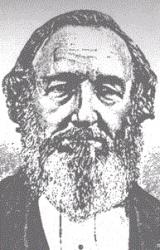
1836 - 1920 Person Name: Edwin P. Parker, 1836-1925 Arranger of "LAST HOPE" in Ambassador Hymnal Parker, Edwin Pond, D.D., born at Castine, Maine, Jan. 13, 1836, and educated at Bowdoin College, Maine, and Bangor Theo. Sem., Maine. Entering the Congregational ministry, he became pastor of the Second Church of Christ, Hartford, Conn., Jan. 1860, and has remained there to the present date. Besides editing some Sunday School Hymn and Tune Books, now out of use, he was chief Editor of The Book of Praise . . . (Congregational) . . ., Phila., 1874; and Editor of The Christian Hymnal, Hartford, Conn., 1877, revised ed. 1889. His hymns in common use include:—
1. Blest are they in Christ departed. [Death and Burial.] Dated 1886. In the Christian Hymnal, 1889, and several other collections.
2. Come to Jesus, ye who labour. [Invitation.] Written in 1898, and included in The Pilgrim Hymnal , 1904.
3. Hail, Holy Light, the world rejoices. [Morning.] Dated 1889, and given in The Christian Hymnal, 1889, The Pilgrim Hymnal, 1904, and others.
4. I would tell Jesus. [The Soul's Desire.] Written in 1887, and included in The Christian Hymnal, 1889.
5. Lord, as we Thy Name profess. [Sincerity.] Dated 1889, first published in The Christian Hymnal, 1889, and subsequently in several other collections, including The Pilgrim Hymnal, 1904.
6. Master, no offering costly and sweet. [Love and Service.] Originally written in 1888, to close a sermon, and first published in The Christian Hymnal, 1889, together with music by the author. It has been adopted, together with the original music, by many compilers. For both words and music see The Pilgrim Hymnal, 1904.
7. O Master, Brother, Lord, and Friend. [Christmas.] Written to close a Christmas sermon, 1903; first printed in a local newspaper, and then included in The Pilgrim Hymnal, 1904.
8. Thy Name, O Lord, in sweet accord. [Divine Worship.] First published in The Christian Hymnal, 1889, and subsequently in several collections, including The Pilgrim Hymnal, 1904.
Dr. Parker received his D.D. from Yale University, and is at the present time (1906) Chaplain to the Senate of the State of Connecticut. The above annotations are based upon Dr. Parker's manuscript notes.
--John Julian, Dictionary of Hymnology, New Supplement (1907)
Edwin Pond Parker

